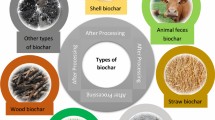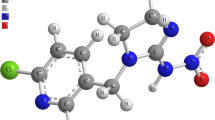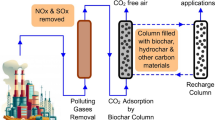Abstract
Plastic pollution has become a serious threat to living organisms on earth. Nanoparticles acquire idiosyncratic potentiality in polymer degradation by improving the degradation process through performing intense photocatalytic degradation. This work presents a novel and simple approach for detecting, degrading, and removing plastic pollutants using cadmium sulfide nanoparticles (CdS) as a coupler, which exhibit excellent adsorption and catalytic properties substituted on Barium/Cobalt on Bismuth ferrite oxide (BBFCO). It is treated with biomass-sourced activated carbon to improve the adhesion power; non-coalesced state and highly permeable CdSNPs@BBFCO/AC nanocomposites formations. The synthesized CdSNPs@BBFCO/AC nanocomposite was used to detect and degrade the real plastic samples like high-density polyethylene (HDPE), low-density polyethylene (LDPE), polytetrafluoroethylene (PTFE) and nylon present in the selected samples, obtained from the commercially available polythene bags and the textile effluent. The presence of polymer-based functional groups which is responsible for polymerization was detected using a radical trapping test and degraded to –C=O, –OOH and –OH using CdSNPs@BBFCO/AC nanostructures confirmed using Fourier transform spectroscopy. UV-absorption spectroscopy is used to verify the removal of plastic contaminants from final products obtained after the degradation process. Further, the prepared composites of both CdSNPs@BBFCO and CdSNPs@BBFCO/AC were used to degrade methylene blue dye and the textile effluent, which shows that the activated carbon impregnated composite possesses better enhancement in degradation efficiency, apparent rate constant and the square of correlation coefficient compared with the CdSNPs@BBFCO composites as a catalyst. Therefore, the CdSNPs@BBFCO/AC nanocomposites act as a potential candidate for plastic pollutant detection, degradation, and removal processes.
Graphical abstract









Similar content being viewed by others
References
Aji M, Rahmawati I, Priyanto A, Karunawan J, Lidia Wati A, Susanto AN, Wibowo E, Sulhadi S (2018) Optical absorption in recycled waste plastic polyethylene. J Phys Conf Ser 983:012007. https://doi.org/10.1088/1742-6596/983/1/012007
Allen N, Edge M, Sandoval G, Verran J, Catalina F, Bygott C, Kerrod J (2021) Research perspectives on the photocatalytic activity of titanium dioxide: catalytic assessment methods in solution and solid-state in relation to particle surface activity. Polym Degrad Stab. https://doi.org/10.1016/j.polymdegradstab.2021.109624
Al-Rawashdeh NAF, Allabadi O, Aljarrah MT (2020) Photocatalytic activity of graphene oxide/zinc oxide nanocomposites with embedded metal nanoparticles for the degradation of organic dyes. ACS Omega. https://doi.org/10.1021/acsomega.0c03608
Amer Inayat AI, Andrea Fasolini AF, Francesco Basile FB, Dagmar Fridrichova DF, Pavel Lestinsky PL (2022) Chemical recycling of waste polystyrene by thermo-catalytic pyrolysis: a description for different feedstocks, catalysts and operation modes. Polym Degrad Stab. https://doi.org/10.1016/j.polymdegradstab.2022.109981
Atta N, Galal A, El-Ads E (2016) Perovskite nanomaterials—synthesis, characterization, and applications. In: Pan L, Zhu G (eds) Perovskite materials—synthesis, characterisation, properties, and applications. IntechOpen, NewYork. https://doi.org/10.5772/61280
Barroso-Bogeat AM, Alexandre-Franco C, Fernández-González V (2014) Gómez-Serrano, Preparation of activated carbon-metal oxide hybrid catalysts: textural characterization. Fuel Process Technol 126:95–103. https://doi.org/10.1016/j.fuproc.2014.04.022
Bashir M, Mehmood MS, Choudary MA, Yasin T, Ahmad I, Tariq M, Ikram M (2015) Analysis of pulse-laser-induced modifications on high-density polyethylene for laser processing of polyethylene. J Russ Laser Res. https://doi.org/10.1007/s10946-015-9498-8
Caroline P, Santhosh Kumar P, Sarkar S, Krishnamoorthi C, Manikandan N, Vinitha G, Daniel J (2022) Enhanced visible light photocatalytic activity of magnetic cobalt doped BiFeO3. Surf Interfaces 31:102050. https://doi.org/10.1016/j.surfin.2022.102050
Chakraborty S, Chakraborty N, Mondal S, Pal M (2022) Band gap engineered Sn-doped bismuth ferrite nanoparticles for visible light induced ultrafast methyl blue degradation. Ceram Int 48:37253–37263. https://doi.org/10.1016/j.ceramint.2022.08.303
Cheng L, Xiang Q, Liao Y, Zhang H (2018) CdS-based photocatalysts. Energy Environ Sci. https://doi.org/10.1039/C7EE03640J
David M, Prakash L, Sangeetha J, Naik J, Thangadurai D, Thimmappa SC (2020) Degradation of plastics using nanomaterials. In: Kharissova O, Martínez L, Kharisov B (eds) Handbook of nanomaterials and nanocomposites for energy and environmental applications. Springer, Cham. https://doi.org/10.1007/978-3-030-11155-7_74-1
Devi LG, Rajashekhar K (2011) A kinetic model based on non-linear regression analysis is proposed for the degradation of phenol under UV/solar light using nitrogen doped TiO2. J Mol Catal A Chem 201:65–76
Devi RA, Latha M, Velumani S, Oza G, Reyes-Figueroa P, Rohini M, Becerril-Juarez IG, Lee JH, Yi J (2015) Synthesis and characterization of cadmium sulfide nanoparticles by chemical precipitation method. J Nanosci Nanotechnol. https://doi.org/10.1166/jnn.2015.11472
Dinooplal S, Sunil Jose T, Rajesh C (2019) Solid-phase photodegradation of polystyrene by nano TiO2 under ultraviolet radiation. Environ Nanotechnol Monit Manag 12:100229. https://doi.org/10.1016/j.enmm.2019.100229
Doris K, Mederake L (2021) Government policies combatting plastic pollution. Curr Opin Toxicol 28:87–96. https://doi.org/10.1016/j.cotox.2021.10.003
El-Aal MA, Ali HM, Ibrahim SM (2022) Cu-doped 1D hydroxyapatite as a highly active catalyst for the removal of 4-Nitrophenol and dyes from water. ACS Omega 7:26777–26787. https://doi.org/10.1021/acsomega.2c03106
Espino D, Haruvy-Manor Y, Bar Y, Mastai Y (2018) Radical degradation processes initiated by catalytic nanoparticles of CoFe2O4 towards polymer waste application. United States. https://doi.org/10.1007/S10924-018-1222-7
Gupta S, Monika Tomar AR, James VG (2013) Study of A-site and B-site doping on multiferroic properties of BFO thin films. Ferroelectrics. https://doi.org/10.1080/00150193.2013.842748
Han W, Luo L, Zhang S (2012) Adsorption of bisphenol A on lignin: Effects of solution chemistry. Int J Environ Sci Technol. https://doi.org/10.1007/s13762-012-0067-1
Irfan S, Rizwan S, Shen Y et al (2017) The gadolinium (Gd3+) and Tin (Sn4+) Co-doped BiFeO3 nanoparticles as new solar light active photocatalyst. Sci Rep 7:42493. https://doi.org/10.1038/srep42493
Ivanova I, Mendive MBC, Bahnemann D (2016) The role of nanoparticulate agglomerates in TiO2 photocatalysis: degradation of oxalic acid. J Nanopart Res. https://doi.org/10.1007/s11051-016-3495-x
Jiao X, Li M, Cheng Z, Yu X, Yang S, Zhang Y (2020) Recyclable superhydrophobic, antimoisture-activated carbon pellets for air and water purification. ACS Appl Mater Interfaces. https://doi.org/10.1021/acsami.0c06274
Jung MR, Horgen FD, Orski SV, Viviana Rodriguez C, Beers KL, Balazs GH, Jones TT, Work TM, Brignac KC, Royer S-J, Hyrenbach KD, Jensen BA, Lynch JM (2018) Validation of ATR FT-IR to identify polymers of plastic marine debris, including those ingested by marine organisms. Mar Pollut Bull 127:704–716. https://doi.org/10.1016/j.marpolbul.2017.12.061
Jusoh N, Rosly MB, Othman N, Abdul Rahman H, Mohamed Noah NF, Raja Sulaiman RN (2020) Selective extraction and recovery of polyphenols from palm oil mill sterilization condensate using emulsion liquid membrane process. Environ Sci Pollut Res 27:23246–23257. https://doi.org/10.1007/s11356-020-07972-5
Kamweru K, Gichuki Ndiritu P, Kinyanjui F, Wanjiku Muthui T, Gichuki Ngumbu ZR, Migunde Odhiambo P (2014) UV absorption and dynamic mechanical analysis of polyethylene films. Int J Phys Sci. https://doi.org/10.5897/IJPS2014.4229
Khan ME (2021) State-of-the-art developments in carbon-based metal nanocomposites as a catalyst: photocatalysis. Nanoscale Adv. https://doi.org/10.1039/D1NA00041A
Kiener J, Limousy L, Jeguirim M, Le Meins J-M, Hajjar-Garreau S, Bigoin G, Ghimbeu CM (2019) Activated carbon/transition metal (Ni, In, Cu) hexacyanoferrate nanocomposites for cesium adsorption. Materials 12(8):1253. https://doi.org/10.3390/ma12081253
Konnerth P, Jung D, Straten JW, Raffelt K, Kruse A (2021) Metal oxide-doped activated carbons from bakery waste and coffee grounds for application in supercapacitors. Materi Sci Energy Technol 4:69–80. https://doi.org/10.1016/j.mset.2020.12.008
Kundu A, Mondal A (2020) Photodegradation of methylene blue under direct sunbeams by synthesized anatase titania nanoparticles. SN Appl Sci. https://doi.org/10.1007/s42452-019-0280-3
Li J, Cai D, Song J, Jin D, Yu S, Cheng J (2010) Synthesis and photocatalytic property of Ba-doped BiFeO3 nanoparticles. In: 2010 IEEE international symposium on the applications of ferroelectrics (ISAF), pp 1–4. https://doi.org/10.1109/ISAF.2010.5712271
Liu G, Ma J, Li X, Qin Q (2009) Adsorption of bisphenol A from aqueous solution onto activated carbons with different modification treatments. J Hazard Mater. https://doi.org/10.1016/j.jhazmat.2008.09.038
Mekonnen TK, Devi S, Dillu V, Chauhan S (2022) Effects of Sm and Cr co-doping on structural, magnetic, optical and photocatalytic properties of BiFeO3 nanoparticles. Mater Sci Eng B 283:15859. https://doi.org/10.1016/j.mseb.2022.115859
Mina G, Sheibani S, Abdizadeh H, Golobostanfard MR (2023) Modified BiFeO3/rGO nanocomposite by controlled synthesis to enhance adsorption and visible-light photocatalytic activity. J Market Res 22:1250–1267. https://doi.org/10.1016/j.jmrt.2022.11.184
Mizuhata Y, Tokitoh N (2017) Chapter 10—silaaromatics and related compounds. In: Lee VY (ed) Organosilicon compounds. Academic Press, New York, pp 619–641. https://doi.org/10.1016/B978-0-12-801981-8.00010-1
Mool C, Rawata AS, Khanujab M, Rawatc S, Ranwa M (2022) IOP Conf Ser Mater Sci Eng 1221:012058
Ning Z, Gong X, Comin R, Walters G, Fan F, Voznyy O, Yassitepe E, Buin A, Hoogland S, Sargent EH (2021) Reply to: Perovskite decomposition and missing crystal planes in HRTEM. Nature 7862:E8–E9. https://doi.org/10.1038/s41586-021-03424-3
Pichat P (1986) Adsorption and desorption processes in photocatalysis. In: Pelizzetti E, Serpone N (eds) Homogeneous and heterogeneous photocatalysis. NATO ASI series, vol 174. Springer, Dordrecht. https://doi.org/10.1007/978-94-009-4642-2_31
Pino-Ramos VH, Bucio E, Díaz D (2021) Fast photocatalytic polypropylene degradation by nanostructured bismuth catalysts. Polym Degrad Stab. https://doi.org/10.1016/j.polymdegradstab.2021.109648
Preetha S, Ramamoorthy S, Pillai R, Narasimhamurthy B, Lekshmi IC (2022) Influence of Lanthanum-doping on photocatalytic activity of magnetic BiFeO3 nanocrystals for sunlight driven degradation of metachrome yellow. Mater Today Proc 62:5396–5401. https://doi.org/10.1016/j.matpr.2022.03.608
Pstrowska K, Szyja B, Czapor-Irzabek H, Kiersnowski A, Walendziewski J (2017) The properties and activity of TiO2/beta-SiC nanocomposites in organic dyes photodegradation. Photochem Photobiol 93:558–568. https://doi.org/10.1111/php.12705
Rao K, Manjunath Kamath S, Rajesh Kumar GK, MeherAbhinav E, Sobana Shri S, Induja S, Gopalakrishnan C (2021) Delineating the photocatalytic properties of doped mullite Bi2Fe4O9 by virtue of Gd3+ ions. Mater Lett 297:129960. https://doi.org/10.1016/J.MATLET.2021.129960
Ronca S (2017) Chapter 10—polyethylene. In: Gilbert M (ed) Brydson’s plastics materials, 8th edn. Butterworth-Heinemann, New York, pp 247–278. https://doi.org/10.1016/B978-0-323-35824-8.00010-4
Shahzad H, Anjum TA, Shabbir B, Waseem M, Naveed-Ul-Haq M, Younis A (2022) Influence of rare earth ions (Dy3+, Eu3+, La3+) on the ultraviolet-light photocatalytic activity and magnetic properties of BiFeO3. Mater Chem Phys 290:126581. https://doi.org/10.1016/j.matchemphys.2022.126581
Shang J, Chai M, Zhu Y (2003) Solid-phase photocatalytic degradation of polystyrene plastic with TiO2 as photocatalyst. J Solid State Chem 174:104–110. https://doi.org/10.1016/S0022-4596(03)00183-X
Shen Y, Tang J, Nie Z, Wang Y, Ren Y, Zuo L (2009) Preparation and application of magnetic Fe3O4 nanoparticles for wastewater purification. Sep Purif Technol 68:312–319
Shi J, Guo L (2012) ABO3-based photocatalysts for water splitting. Prog Nat Sci Mater Int 22:592–615. https://doi.org/10.1016/j.pnsc.2012.12.002
Singh S, Barick KC, Bahadur D (2011) Novel and efficient three dimensional mesoporous ZnO nanoassemblies for environmental remediation. Int J Nanosci 10:1001–1005
Sukumar M, Kennedy LJ, Vijaya JJ, Najar B, Bououdina M (2018) Co2+ substituted La2CuO4/LaCoO3 perovskite nanocomposites: synthesis, properties and heterogeneous catalytic performance. New J Chem. https://doi.org/10.1039/C8NJ04133D
Tayyebeth S, Lee B-K (2020) Ag-doped BiVO4/BiFeO3 photoanode for highly efficient and stable photocatalytic and photoelectrochemical water splitting. Sci Total Environ 736:138640. https://doi.org/10.1016/j.scitotenv.2020.138640
Venkatesh S, Venkatesh K, Quaff AR (2017) Dye decomposition by combined ozonation and anaerobic treatment: cost effective technology. J Appl Res Technol. https://doi.org/10.1016/j.jart.2017.02.006
Wang L, Li J, Jiang Q, Zhao L (2012) Water-soluble Fe3O4 nanoparticles with high solubility for removal of heavy-metal ions from waste water. Dalton Trans 41:4544–4551
Xu J-L, Lin X, Hugelier S, Herrero-Langreo A, Gowen AA (2021) Spectral imaging for characterization and detection of plastic substances in branded teabags. J Hazard Mater 418:126328. https://doi.org/10.1016/j.jhazmat.2021.126328
Yongming H, Fei L, Zhang Y, Jikang Yuan Yu, Wang HG (2011) Synthesis of bismuth ferrite nanoparticles via a wet chemical route at low temperature. J Nanomater. https://doi.org/10.1155/2011/797639
Zhang F, Wang X, Liu H, Liu C, Wan Y, Long Y, Cai Z (2019) Recent advances and applications of semiconductor photocatalytic technology. Appl Sci. https://doi.org/10.3390/app9122489
Zhang Y, Wang Z, Zhu J, He X, Xue H, Li S, Mao W, Yong Pu, Li X (2023) Ferroelectric polarization effect on the photocatalytic activity of Bi0.9Ca0.1FeO3/CdS S-scheme nanocomposites. J Environ Sci 124:310–318. https://doi.org/10.1016/j.jes.2021.09.021
Acknowledgements
The authors are thankful to DST-SERB(EMR/2015/000320), New Delhi, India for the financial assistance.
Author information
Authors and Affiliations
Contributions
BM Investigation, Experimental analysis and original draft writing, UM review and editing, PR Supervision, review and editing, Suresh Sahadevan, review and editing.
Corresponding author
Ethics declarations
Conflict of interest
The authors acknowledged that they have no known financial interest or personal relationship that could influence this work.
Additional information
Editorial responsibility: Chongqing Wang.
Rights and permissions
Springer Nature or its licensor (e.g. a society or other partner) holds exclusive rights to this article under a publishing agreement with the author(s) or other rightsholder(s); author self-archiving of the accepted manuscript version of this article is solely governed by the terms of such publishing agreement and applicable law.
About this article
Cite this article
Murugan, B., Mahalingam, U., Ramasamy, P. et al. Biomass-sourced activated carbon on CdSNPs@BBFCO matrix for polymer degradation in aqueous plastic samples and the textile effluent. Int. J. Environ. Sci. Technol. 21, 1831–1848 (2024). https://doi.org/10.1007/s13762-023-05018-0
Received:
Revised:
Accepted:
Published:
Issue Date:
DOI: https://doi.org/10.1007/s13762-023-05018-0




